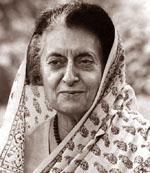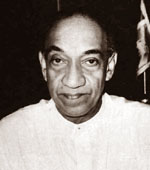The Indian factor

FOREIGN POLICY: Having spent the last couple of weeks on
comparatively parochial concerns, the internal problems of our two main
parties, I thought I should move on this week to a larger canvas. I was
prompted to this by continuing discussion, in the media and elsewhere,
about Indian responses to recent developments in Sri Lanka.
Most recently I noticed two very different articles on the same day,
in two papers, conveying very different ideas about the President’s
visit to China. One suggested that this was part of a new strategy to
counter Indian concerns about current government policy.
The other indicated that this was unlikely, since it was obvious that
China was not aggressive in its foreign policy, and there was no way in
which the Indian position in South Asia would be challenged.
|

Indira Gandhi
|
Then, a couple of days later, I was at a seminar at which another
distinguished commentator on the political scene reiterated the view, or
rather the suspicion, that the visit to China could be construed as
adventurism of the sort that had characterised Sri Lankan foreign policy
in the eighties.
He mentioned that then there had been an attempt to counter India
with the United States, and this had been disastrous.
Foreign Policy
It struck me then that this, the preposterous nature of our foreign
policy under the Jayewardene government, must indeed be obvious to
everyone.
Therefore, it was unlikely that anyone in charge of decision making
now would want to revisit that route. Of course strange things can
happen, and there may still be people resentful of India who dream of
challenging its hegemony.
But it is unlikely that professionals and intelligent politicians who
know what happened in the past, and who know the way the world is moving
now, would try to reverse history.
Rather, I suspect the constant assertions in some sections of the
press, that the government is trying to set both Pakistan and China off
against India, is wishful thinking.
Or, conceivably, it is part of the practice that has regrettably
become common, of badmouthing the government amongst foreigners, in this
case in an attempt to frighten the Indians into believing that the
current government is as myopic as the Jayewardene government was.
That such behaviour is part of the strategy of the extreme elements
in the opposition became clear a year ago, when Tamil Net gave
prominence to Wickremesinghe’s allegations in the United States, that
the government was in effect responsible for the violence of the Tigers
just after the Presidential Election.
|

Rajiv Gandhi
|
Recently it was reported that one reason the President had given
Wickremesinghe for his acceptance of crossovers from the UNP was
criticism the latter had made of the government to the Indian government
amongst others, despite the MoU.
That this happened, and was salient, seems more credible in the light
of continuing assertions that seem designed to convince India that she
should resent the current activities of the government.
Now it is possible that India may be resentful of some actions, but I
suspect that predictions of hostility, whether leading to or arising
from our good relations with Pakistan and China, are all nonsense.
Of course India has to be concerned about problems the Tamil
population faces, but the intensity of such concerns, especially in a
context in which the government alone cannot be held responsible for
these, pales before the concerns India had during the eighties.
My own view indeed is that India’s current concerns would best be met
by measures that are precisely those the Sri Lankan Government should
adopt to resolve the problems it now faces.
This is true in particular with regard to the question of the merger
or otherwise of the Northern and Eastern Provinces, which is presented
as a terrific bone of contention by some commentators.
But before arguing this point, it would be useful to go back in
history, to trace the similarities and the differences between what
happened in the eighties and the situation now.
A clear-sighted view of the past would make it obvious that fears
that President Rajapaksa may try to imitate President Jayewardene’s
foreign policy are at best foolish.
The starting point of my analysis will be the 1987 Indo-Lankan
Accord, since that makes clear precisely what India was concerned about
in the preceding period.
On the Sri Lankan side there are still those who present it as a
triumph of statesmanship, in that it led to the Indian government
warring with the Tigers.
Though that happened, the Accord itself was certainly not the
consequence of President Jayewardene’s diplomatic skill. It was rather a
triumph for India, in that it conclusively imposed its will on the Sri
Lankan Government.
|

J.R. Jayewardene
|
That it then ended up fighting with the Tigers was precisely because,
having achieved what it wanted, it was not going to let the Tigers
establish themselves as an independent entity, not least because they
were also a potential threat to wider Indian interests.
The imposition of the Indian will on Sri Lanka was in two respects.
The first, which was the focus of attention in the media then as now,
was the institution of substantial measures of devolution, fiercely
resisted previously, namely not only Provincial Councils, but also the
merger of the Northern and Eastern Provinces.
Though according to the Accord the merger was to be subject to
particular conditions, it is clear from what happened, when those
conditions were hastily amended, that President Jayewardene had agreed
to proceed with the merger in any case.
merger
Furthermore, though the merger was supposed to be provisional, and
subject to a referendum after some years, and though the President
claimed he would campaign against the merger in time, it was also clear
that both sides expected the merger to stay in place for ever and that
the executive powers bestowed on the merged Provincial Council were
intended to perpetuate it.
The second triumph for India, and much more important for it, though
characteristically this was downplayed, was the acquiescence of the Sri
Lankan Government in Indian hegemony over the region.
This was clear from the appendix to the Accord, which took the form
of an exchange of letters of intent. This was not publicised beforehand,
but only emerged when the final text of the Accord was revealed. In it
the Sri Lankan President agreed
a) to ‘reach an early understanding about the relevance and
employment of foreign military and intelligence personnel’
b) that ‘Trincomalee or any other ports in Sri Lanka will not be
available for military use by any country in a manner prejudicial to
India’s interests’
c) that ‘the work of restoring and operating the Trincomalee oil tank
farm will be undertaken as a joint venture between India and Sri Lanka’
and
d) that ‘Sri Lanka’s agreements with foreign broadcasting
organisations will be reviewed to ensure that any facilities set up by
them in Sri Lanka are used solely as public broadcasting facilities and
not for any military or intelligence purposes’.
So much for the sovereignty that some Sri Lankan commentators still
think is absolute. At the same time, it must be recognized that all
these provisions are sensible ones, and there should never have been
attempts to act counter to them in the first place.
Geopolitical realities alone, the sheer size and proximity of India,
should have prevented such adventurism, even had the history and
socio-political context of post-independence Sri Lanka not made it so
inappropriate.
It seems to me obvious then that, in looking at the formulation of
the Accord, it is the motivation and the tactics of India that we must
consider.
Sri Lanka was largely passive in the crucial stages, though it had
created the context for Indian activity toward the end. And as to
motivation, the appendix makes clear the main goal of Indian policy at
that stage, namely to ensure that Sri Lanka did not allow itself to be
used by the United States in the Cold War.
This may seem bizarre now, but we have to remember that the Cold War
was still being fought intensively in the period leading up to the
Accord, and that South Asia was affected more crucially than ever
before.
invaded
The Soviet Union had invaded Afghanistan only at the very end of
1979, and it was just after that that the United States provided money
and materials and training to Islamic fundamentalists through Pakistan,
then led by General Zia ul Haq. That some of these resources went toward
terrorism in India cannot be doubted.
After all, when the United States, a decade later, bombed an Al Qaeda
training camp in Afghanistan after one of the minor attacks against it
that preceded the assault on the Twin Towers, it was Kashmiris who were
killed.
And in the early eighties India also faced terrorism in the Punjab.
In such a context it was understandable that President Jayewardene’s
anxiety to provide facilities to the United States in Sri Lanka should
have been worrying.
Though it was unfortunate that, to assuage these worries, India chose
to destabilize Sri Lanka by itself assisting Sri Lankan terrorists, it
is foolish of Sri Lankan commentators not to recognize that essentially
the creation of an adversarial approach was our own responsibility.
Though there is a school of thought that claims India wanted to
destabilize Sri Lanka for economic reasons, to prevent the creation of a
Singapore style open economy that might threaten its own very different
approach to development, the fact is that Sri Lanka’s divergent domestic
policies were accompanied by adventurism on the lines indicated by the
appendix to the Accord.
Thus, in 1985, the government finalized arrangements for the leasing
out of land to the Voice of America (VoA) to establish a broadcasting
station near Trincomalee.
The agreement gave responsibility for the security of the area to the
VoA, which could understandably be interpreted by India as the provision
of facilities for American defence personnel in general.
Trincomalee being a fine natural harbour obviously made perceptions
of a threat more acute, at a time when India wanted the Indian Ocean to
be a Zone of Peace.
Earlier in the eighties they had protested when old oil tanks
constructed near Trincomalee during the Second World War had been leased
to an American company.
The lease was cancelled, but an agreement was later reached with
another company which opposition members of Parliament alleged was
simply a front for the first.
That agreement too fell through, arguably under Indian pressure.
Therefore the provision a couple of years later of facilities that
included absolute rights of defence to the VoA were naturally seen as
continuation of a threatening policy.
My argument then is that this problem was the main reason for the
Indo-Lankan Accord, and that having resolved it satisfactorily, through
Jayewardene’s agreement in the Appendix to stop all this adventurism,
India was happy to collaborate with Sri Lanka on everything else.
Unfortunately the pretext for their intervention had been the ethnic
crisis in Sri Lanka, and therefore it is measures to resolve this crisis
that were the publicly promoted substance of the Accord.
It is this crisis that has continued, and that needs to be addressed
now. I will argue later that the character of the problem has changed,
which is why in that respect too India is much more likely to be
sympathetic to the Sri Lankan government than in the eighties.
But my fundamental point today is that, with the Cold War over, and
the reasons for nervousness about its neighbours long in the past, India
has no reason to worry about Sri Lankan hostility.
Even if such hostility were conceivable, which it is not since our
social and economic policies are now once again in congruence, only
delusions of grandeur would make us think that India would take it
seriously.
defensive
India no longer has reason to feel defensive. Leaving aside its
social and economic development, it is on very good terms with the
United States, and the West in general, whilst having continued its
close relationship to the Soviet Union, which means not only Russia now
but also Central Asia - and also Afghanistan.
It is also on reasonably good terms with China and, though tensions
with Pakistan continue, as does the special relationship between China
and Pakistan, there is no sense that this could be a threat.
That special relationship is no longer relevant to the Sri Lankan
position, even whilst Sri Lanka’s own relations with both Pakistan and
China continue excellent.
In short, the crucial factor in the eighties was the position of the
United States, and its relationships then with both China and Pakistan
in the context of the Cold War.
Sri Lanka’s good relations with these last had never particularly
worried India previously, and it was only because of what seemed cosying
up to the United States that alarm bells sounded.
Now however, Sri Lanka can strive to maintain good relations with
both India and the United States, the two super powers that are
particularly concerned with security concerns in the Indian Ocean,
without fear that inclination to one will provoke an adverse reaction in
the other.
In short, we can continue, without looking anxiously over our
shoulders, to build good relations with all three Asian countries that
concern us closely, just as we did before President Jayewardene got
carried away by his own genius. |

